|
|
|
Sort Order |
|
|
|
Items / Page
|
|
|
|
|
|
|
| Srl | Item |
| 1 |
ID:
128397
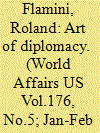

|
|
|
|
|
| Publication |
2014.
|
| Summary/Abstract |
Early in October 2013, a group of high-ranking Greek officials, including Prime Minister Antonis Samaras, came to Washington for the opening of a major art exhibition from their country at the National Gallery of Art. But the black-tie event and the press conference to inaugurate the show, "Heaven and Earth: Art of Byzantium from Greek Collections," were both canceled because of the government shutdown. As a result, a party of angry Greeks left for home muttering darkly about fearing Americans when you bear them gifts. The Greeks were not even allowed a private visit to the exhibition in which virtually every precious icon, ancient manuscript, and piece of mosaic had been loaned by museums and institutions in their country.
|
|
|
|
|
|
|
|
|
|
|
|
|
|
|
|
| 2 |
ID:
125281


|
|
|
|
|
| Publication |
2013.
|
| Summary/Abstract |
Disasters are not only increasing in number, they are becoming more complex as natural and man-made crises combine to cause mega-disasters. Rapid urbanization, population growth, political unrest, and migration have created fragile environments in many countries, and boundaries are blurring between complex emergencies and chronic vulnerability in places such as the Democratic Republic of the Congo and Somalia. These factors have resulted in intense pressure on the UN's humanitarian organizations and partners to respond more quickly when disaster strikes and to be more effective in its response.
|
|
|
|
|
|
|
|
|
|
|
|
|
|
|
|
| 3 |
ID:
133775


|
|
|
|
|
| Publication |
2014.
|
| Summary/Abstract |
Because autocrats can rarely be voted out of power, most find themselves exiting office in far less conventional ways. Since the 1950s, the coup d'état-or the illegal seizure of power by the military-has been by far the most common.1 During the 1960s and '70s, for example, about half of all autocrats who lost power did so through a coup. But fast-forward to the 2010s, and a different picture is emerging. The chain of protests during the Arab Awakening, which toppled four of the world's longest-standing rulers-Zine al-Abidine Ben Ali of Tunisia, Hosni Mubarak of Egypt, Muammar Qaddafi of Libya, and Ali Abdullah Saleh of Yemen-led many political observers to rejoice in the masses' ability to unseat autocratic strongmen. But are these revolts evidence that autocrats are becoming increasingly vulnerable to the masses? Or are they short-term exceptions to a longer-standing rule of autocratic ouster?
|
|
|
|
|
|
|
|
|
|
|
|
|
|
|
|
| 4 |
ID:
133776
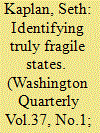

|
|
|
|
|
| Publication |
2014.
|
| Summary/Abstract |
That the Arab Spring caught the world off guard is hardly surprising. Interpreting overt stability as a reflection of fundamental strength or resiliency has often set the international community up for surprise. Few forecast the dissolution of the Soviet Union, for example; far too few in Washington anticipated what would follow the invasion of Iraq. These are reminders that apparent stability can be little more than an illusion.
|
|
|
|
|
|
|
|
|
|
|
|
|
|
|
|
| 5 |
ID:
133912
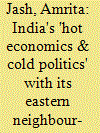

|
|
|
|
|
| Publication |
2014.
|
| Summary/Abstract |
India and China have made a significant stride in their bilateral relations which is exemplified in their 60 years of the 'Panchsheel Agreement of 1954'. Though India's relations with China has often been weighed down by the protracted boundary problem but the growing economic engagement has given a new high to the relationship. The growing economic interests between the two rapidly growing Asian giants significantly suggest that commerce can even flourish in the presence of very hostile relations. This unique characteristic of India's relations with China based on their convergent economic interests and divergent political interests posit a unique case study of both cooperation and conflict running parallel to each other.
|
|
|
|
|
|
|
|
|
|
|
|
|
|
|
|
| 6 |
ID:
134002
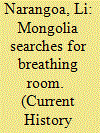

|
|
|
|
|
| Publication |
2014.
|
| Summary/Abstract |
Sandwiched between Russia and China, Mongolia has long been dominated by the two giants that surround it. Indeed, for most of the past four centuries, the choice between its neighbors' influence has been an either-or proposition. With the brief exception of Japan's intervention on the Asian mainland during World War II, there were no external powers that Mongolia could conceivably approach to soften the harsh Russia-China alternative. In recent years, though, the situation has changed dramatically. For the first time in modern history, Mongolia has asserted its sovereign right to engage in numerous bilateral relationships outside the old Russia-China dynamic, focusing on both strategic affairs and economics. In 2013 alone, the nation signed 63 bilateral and international agreements.
|
|
|
|
|
|
|
|
|
|
|
|
|
|
|
|
| 7 |
ID:
133774
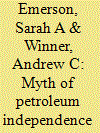

|
|
|
|
|
| Publication |
2014.
|
| Summary/Abstract |
U.S. politicians often work the topic of oil import independence into their campaign rhetoric as an ideal that would help separate U.S. economic prosperity and military responsibility from the volatility of Middle Eastern politics. In theory, oil independence would mean that events such as the Iranian revolution or internal political unrest in key Arab oil producers would have much less direct impact on the flow of oil to the United States, and thus U.S. prosperity (even if, in a global market for oil, the price impact of any supply disruption is shared by all consuming countries). More importantly, intra-state conflicts such as the Iraq-Iran war or the Iraqi invasion of Kuwait would not necessarily require large-scale U.S. military involvement to ensure oil production and exports to the United States and its allies. This linkage between U.S. oil import dependence and military commitment to the Gulf region has given rise to a myth favored by policymakers, markets, and the public that if the United States could attain oil independence, we could also reduce our military responsibilities around the world. Recent and ongoing changes in both the oil sector and in political-military strategy are for the first time in forty years combining in a manner that is leading some to believe this story could come true.
|
|
|
|
|
|
|
|
|
|
|
|
|
|
|
|
| 8 |
ID:
122546
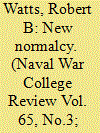

|
|
|
|
|
| Publication |
2012.
|
| Summary/Abstract |
In September 1994, the Caribbean nation of Haiti burst into political unrest that
drove twenty-six thousand migrants out to sea on board overcrowded and unseaworthy craft in an unprecedented mass migration to the United States. Several
months later, over thirty thousand Cubans followed suit, attempting to reach the
mainland on literally anything that could float. On 31 August 2005, a "weapon of
mass destruction" in the form of a category-five hurricane exploded in the Gulf
coast city of New Orleans, killing over 1,300 citizens and forcing the evacuation
of tens of thousands. Finally, on 20 April 2010, the Deepwater Horizon exploratory oil rig exploded, heralding an unprecedented environmental disaster whose
final impact has yet to be determined.
|
|
|
|
|
|
|
|
|
|
|
|
|
|
|
|
| 9 |
ID:
174992
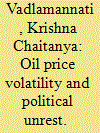

|
|
|
|
|
| Summary/Abstract |
Revenue from oil makes countries susceptible to the “resource curse” since rulers have ready access to finance for buying off opposition rather than reform. We explore this issue by examining whether oil price volatility affects anti-government unrest. We argue that in oil-producing countries, low price years generate anti-government protest conditional on a state's access to foreign exchange reserves. The prudent management of oil revenue during boom years can allow some oil-rich states to manage political dissent while others fail. Contrarily, in oil-importing countries, high oil price years increase anti-government dissent, but again, conditional on access to foreign exchange reserves, which allow governments to ease the pain of austerity. Using panel data covering 165 countries between 1980 and 2013 (34 years), we find clear evidence in support of these propositions. Oil-producer countries that are able to resist political Dutch disease and save for “rainy days” are more capable of weathering low-price years. Similarly, oil import-dependent states face higher dissent during high oil price years, but conditional on access to foreign reserves. These results are in line with others that show that some oil producers avoid civil war through heavy public spending. Oil-rich countries should manage oil revenues in ways that allow them to survive the low price years, perhaps by avoiding both economic and political Dutch disease, which will only lead to inevitable regime challenge. The results are robust to alternative data, measurement, sample size, and estimation methods.
|
|
|
|
|
|
|
|
|
|
|
|
|
|
|
|
| 10 |
ID:
139473
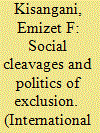

|
|
|
|
|
| Summary/Abstract |
The central African republic(CAR) became independent in August 1960.
|
|
|
|
|
|
|
|
|
|
|
|
|
|
|
|
| 11 |
ID:
184423
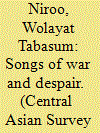

|
|
|
|
|
| Summary/Abstract |
This study explores two adult women’s self-authored and self-composed songs and life history in a north-eastern province of Afghanistan. The women did not sing to entertain the researcher or their visitors. Instead, they sang in the form of lament to express their grief. The author argues that by singing, women create a space in which they lament, communicate with their lost loved ones and criticize political ongoings that resulted in despair. The study also explores how the women cope with their inner feelings and sufferings that are the outcome of more than four decades of civil unrest in the country.
|
|
|
|
|
|
|
|
|
|
|
|
|
|
|
|
|
|
|
|
|